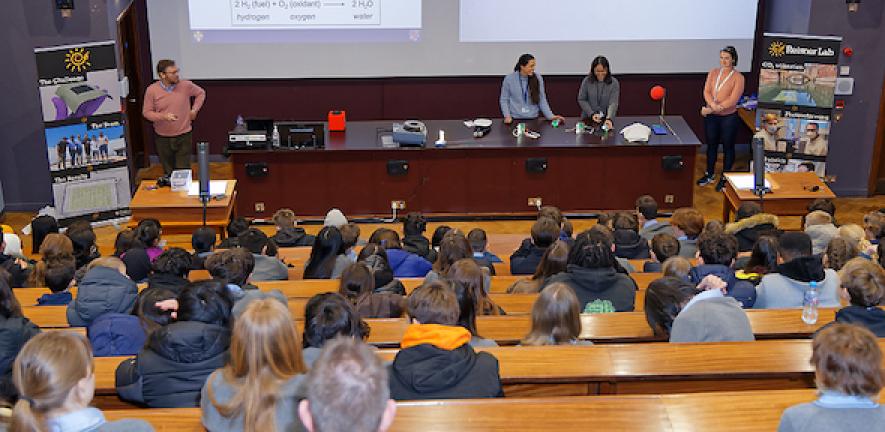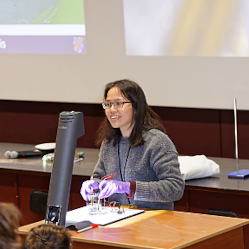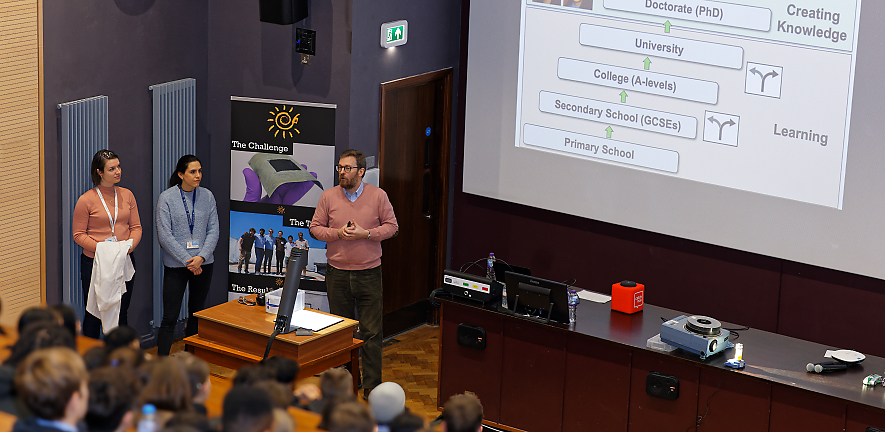
More than 100 Year 10 students and teachers from Parkside Community College gathered in the department for this outreach event, led by Professor of Energy and Sustainability Erwin Reisner and group members Carolina Pulignani, Celine Wing See Yeung and Dr Tessel Bouwens.
What do I want to be when I grow up?
Reisner kick-started the session, held in the Wolfson Lecture Theatre, by emphasising the need for alternatives to fossil fuels to combat climate change. He described solar fuels, and explained why they will play a key role in the path to a carbon neutral future.
Along the way, Reisner weaved in insights about life in academia and provided career advice. ‘What do I want to be when I grow up?’ can be a daunting question for Year 10 students, especially when they still have a long way to go down the educational pathway, and Reisner’s description of his own experience of being at the crossroads resonated with the audience when he revealed that he once had dreams of becoming a professional football player! Ultimately, he concluded that a passion for Chemistry, coupled with the excitement of researching and developing completely new ideas, led him to a fulfilling career in research.
The Wow factor
 Outreach team members Pulignani, Yeung and Bouwens then wowed the audience with a series of fascinating and fun experiments, which were designed to prompt the students to think about the importance of storing solar energy in the form of fuels.
Outreach team members Pulignani, Yeung and Bouwens then wowed the audience with a series of fascinating and fun experiments, which were designed to prompt the students to think about the importance of storing solar energy in the form of fuels.
The team started with a simple experiment requiring only two pencils and a battery to break down water into hydrogen and oxygen gas. They explained that this process of water electrolysis is currently one of the methods used on an industrial scale to produce hydrogen, and could be made sustainable by using solar power.
They also showed how an inexpensive catalyst (previously developed by the group) could drive water reduction to form hydrogen gas under sunlight, and then used the common sun cream ingredient titanium dioxide to remove a pollutant (in this case food dye) from water. In research, the group has developed this concept even further, degrading pollutants while simultaneously producing solar fuels in a process called photoreforming.
The team applied the concepts they’d demonstrated by propelling a model car with the hydrogen gas that they had produced. Finally, the students reacted with gasps of surprise when Reisner ignited two large hydrogen-filled balloons into flames -- effectively driving home the point of hydrogen as a promising fuel for the future.
Above: Outreach Team member Celine Wing See Yeung performs an experiment for the Parkside students.
Causing students to think
“One of the goals of our outreach days, especially to students about to start their GCSEs, is to get them to start thinking about important global issues and how science can help to solve them,” said Reisner, “And maybe one day they will be the ones who come up with the answers we are looking for.”
Younger students
In November Reisner and the Outreach team also made a special trip to Newnham Croft Primary School for another fantastic morning. “As an ice breaker, the students had a go with guessing our nationalities,” said second-year PhD student Celine Wing See Yeung, noting that the Reisner group is very international, with members from 18 different countries.
After a series of thought-provoking experiments, laughter filled the room when the children watched a video which used their favourite Lego characters in Bricktown to explain the concepts of artificial photosynthesis in a light-hearted manner.
Once again the session ended on a high note with Reisner exploding hydrogen balloons of various sizes. “It’s an activity that never fails to draw excited screams from the audience,” said Yeung, who believes it is important to communicate scientific ideas to the wider community. “Being able to communicate good science with my lab mates Carolina and Tessel makes the experience even more enjoyable,” she added.
Reisner group research
The Reisner group develops new concepts and technologies for the conversion of solar energy and renewable electricity into sustainable fuels and chemicals for a circular economy.
Recent developments include artificial leaves which harness solar power through artificial photosynthesis to create solar fuel. A team from the Reisner Lab and Stranks group in Physics successfully demonstrated a full artificial leaf array this summer in the European Horizon Solar Fuel competition finals.
Amongst its many other projects, the Reisner group has also made substantial advances in using sunlight and waste to create green hydrogen sustainably through photoreforming.
With thanks to Celine Wing See Yeung, who wrote this article.
Below (from left): Postdoctoral researcher Dr Tessel Bouwens and third-year PhD student Carolina Pulignani with Professor Reisner.


